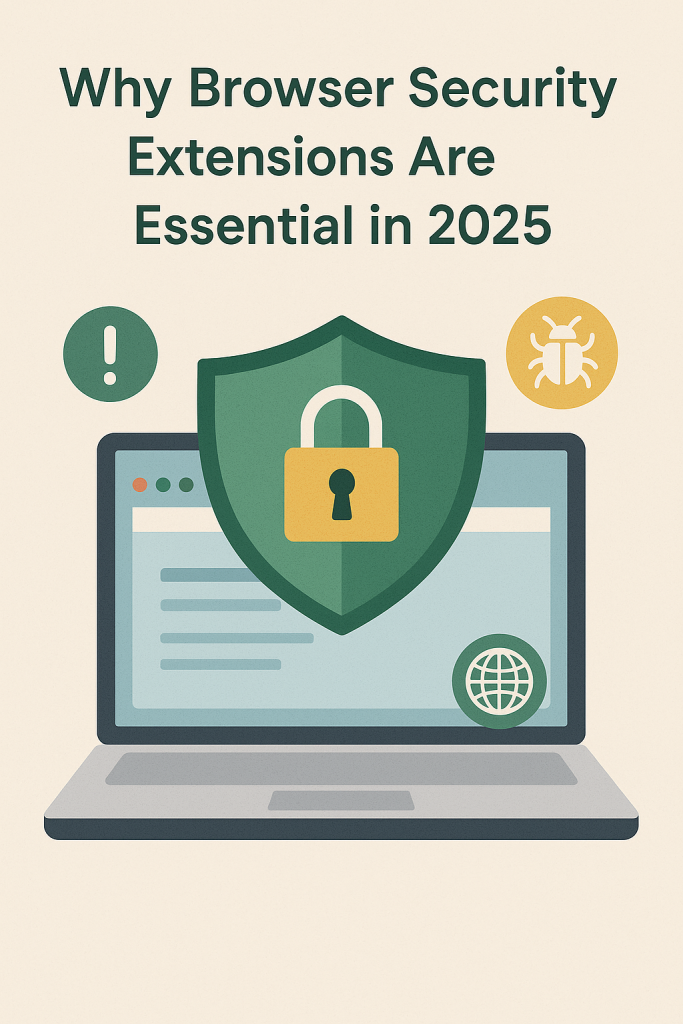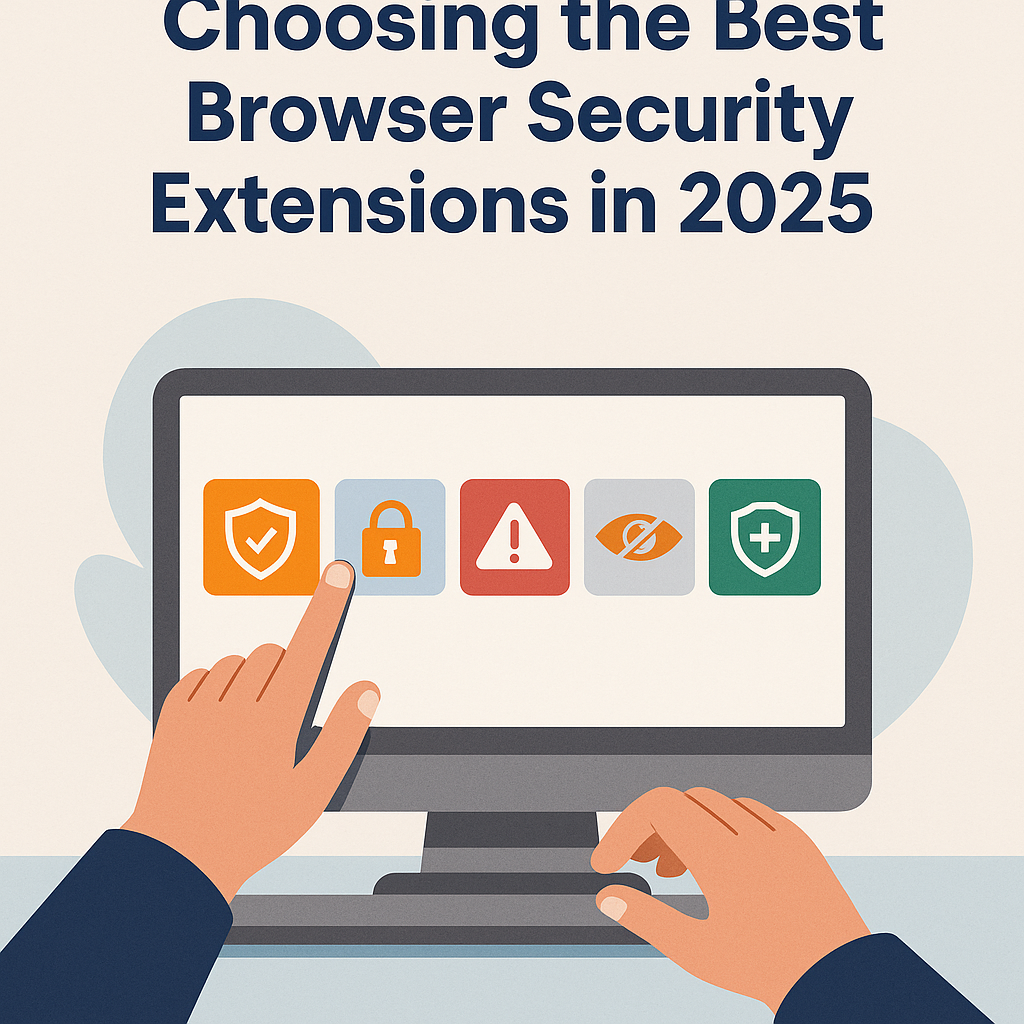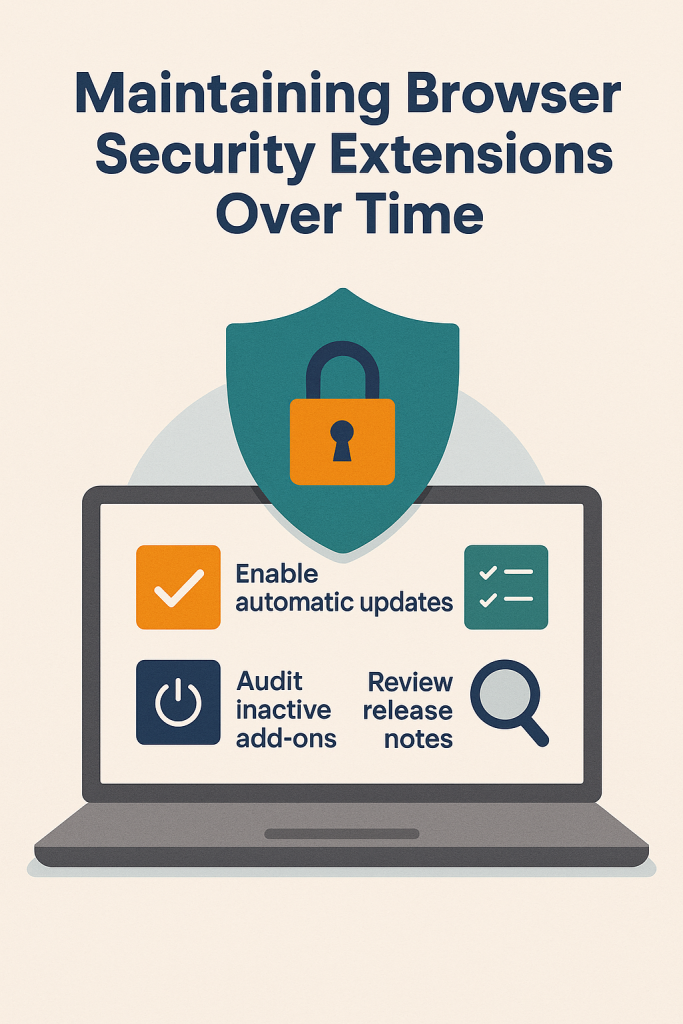Must-Have Extensions for Browser Security

Best Browser Security Extensions for Ultimate Online Protection in 2025
Why Browser Security Extensions Are Essential in 2025
In today’s digital world, online threats have evolved far beyond simple pop-ups and spam emails. Cybercriminals are now using advanced methods to steal personal information, track browsing behavior, and inject malicious code into websites. Therefore, having strong browser security extensions installed is no longer optional—it is essential for protecting your privacy and ensuring safe browsing. These extensions provide an extra shield that your regular antivirus might miss, making them a vital part of your online defense strategy.
How Browser Security Extensions Protect You
Security extensions work by monitoring and filtering the traffic between your browser and the websites you visit. For instance, they can block malicious scripts, warn you about phishing attempts, and prevent unauthorized tracking. Additionally, many modern tools integrate with password managers, helping you store credentials securely and avoid data breaches. By blocking harmful domains before they load, these extensions act as a gatekeeper, ensuring that unsafe content never reaches your screen.
1. Blocking Malicious Websites
One of the most important features of any browser security extension is its ability to detect and block dangerous websites. These tools use real-time threat intelligence databases to identify harmful domains and stop them before they load. Consequently, you can browse with confidence, knowing that phishing pages, fake login portals, and malware-infected sites are automatically blocked.
2. Preventing Tracking and Data Collection
Online advertisers and data brokers often track your browsing activity without your consent. Fortunately, many browser security extensions include anti-tracking technology that prevents websites from collecting your data. This ensures a more private browsing experience and reduces the chances of targeted phishing attacks.
3. Enhancing Safe Browsing with Password Protection
Weak or reused passwords remain a major security risk. Security extensions often integrate with password managers to generate strong, unique passwords for every account. Moreover, they can alert you if your login credentials appear in a known data breach, giving you the opportunity to change them before hackers take advantage.
Examples of Popular Browser Security Extensions
While there are many options available, some extensions stand out due to their effectiveness, ease of use, and strong security features. Below are a few well-known examples:
Bitdefender TrafficLight
This free extension scans the pages you visit in real-time, detecting phishing attempts and blocking malicious content. It also checks search results, marking unsafe links before you click.
uBlock Origin
Though primarily an ad blocker, uBlock Origin also includes anti-malware filters, blocking malicious scripts and harmful domains. It is lightweight, customizable, and trusted by millions worldwide.
Avast Online Security
Avast’s extension warns you about unsafe websites, blocks trackers, and rates sites based on user reviews. Additionally, it integrates seamlessly with the Avast antivirus suite for added protection.
Integrating Browser Security Extensions into Your Setup
When adding security extensions, you must ensure they work well with your existing browser setup. For example, if you are a Google Chrome user, you can check our detailed guide on Google Chrome security tips. Likewise, Firefox users should explore our Firefox security guide for tailored recommendations. Choosing the right extension for your preferred browser ensures maximum efficiency without slowing down your system.
Final Thoughts
Cyber threats will continue to grow more advanced in 2025, making browser security extensions a critical part of your defense strategy. By installing trusted extensions, keeping them updated, and combining them with safe browsing habits, you can greatly reduce your exposure to online risks. In the next part, we will explore the best practices for configuring these tools for maximum protection.
Outbound Reference: PCMag: Best Security Extensions for Browsers

Best Practices for Configuring Browser Security Extensions
Installing browser security extensions is the first step toward better online protection. However, you will only get the best results if you configure them properly. Many users simply add an extension and leave the settings at default, which often means they are missing out on powerful features. Therefore, it is important to explore the configuration options to ensure the extension is providing the maximum level of security without disrupting your browsing experience.
Enable Real-Time Threat Detection in Browser Security Extensions
Most high-quality security extensions include a real-time scanning feature. This function continuously monitors the websites you visit, the links you click, and the files you download. Because threats can appear at any time, enabling this feature ensures that malicious content is blocked before it reaches your device. Moreover, it adds a proactive layer of defense rather than relying on manual scans.
Tune Privacy Controls: Tracking Protection in Browser Security Extensions
Many browser security extensions come with privacy controls that block trackers, cookies, and fingerprinting scripts. By default, some tools only block known trackers, but you can usually enable stricter modes. Consequently, advertisers and data brokers find it much harder to monitor your behavior. If you use Firefox, combining its Enhanced Tracking Protection with an advanced extension yields complete privacy coverage.
Keep Browser Security Extensions Updated Automatically
Cyber threats evolve daily, and outdated extensions become vulnerable. Therefore, enabling automatic updates in your browser is essential. This ensures you always have the latest security patches and threat-intel lists without manual checks. Most browsers, including Google Chrome, update extensions in the background; nevertheless, reviewing your extensions monthly is wise.
Avoid Extension Overload: Smart Stacking of Browser Security Tools
Installing too many tools can slow your browser and cause conflicts. A better strategy is to choose two or three well-reviewed extensions that complement each other. For example, pairing an anti-malware guard with a powerful ad blocker like uBlock Origin offers excellent protection without sacrificing performance.
Balancing Browser Security Extensions with Usability
Security filters sometimes block useful content by mistake (false positives). Fortunately, most browser security extensions let you whitelist trusted sites. By adding legitimate services to an allow-list, you maintain strong protection without constant interruptions. Additionally, customizable filter lists help you fine-tune what to block or allow.
Customize Alerts: Notification Hygiene in Browser Security Extensions
Constant pop-ups can be distracting. Therefore, adjust notification levels so you only see high-risk alerts, while low-risk items are silently handled. This keeps you informed about serious threats without overwhelming messages.
Integrating Browser Security Extensions with Other Security Tools
The strongest defense is layered. While browser security extensions are powerful, you should combine them with reputable antivirus software, a secure VPN, and safe browsing habits. This multi-layer approach ensures that if one tool misses a threat, another catches it.
Use a VPN with Browser Security Extensions for Private Networking
Even with robust extensions, some sites and ISPs can see your IP. A VPN encrypts your traffic and reduces tracking. Furthermore, several privacy suites integrate VPN toggles directly into their extensions, which streamlines daily protection.
Sync Browser Security Extensions Across Devices
Modern browsers sync extensions and settings. If you configure protections on your desktop, you can mirror them on your laptop or phone. Consequently, you keep consistent security wherever you work.
When to Replace or Remove Browser Security Extensions
Not all tools remain reliable forever. If developers abandon updates, performance degrades, or permissions look suspicious, uninstall and switch to a trusted alternative. Regularly auditing your installed extensions keeps your browsing environment clean and secure.
Final Thoughts on Configuring Browser Security Extensions
Proper configuration maximizes protection with minimal friction. By enabling advanced privacy settings, keeping extensions updated, and pairing them with antivirus and VPN solutions, you build a resilient defense against modern threats. Next, compare top-rated tools for your preferred browser to finalize your setup.
Outbound Reference: TechRadar: Best Browser Security Extensions

Top Browser Security Extensions for 2025
After understanding the why and the configuration basics, it is finally time to choose the right tools. Therefore, this section highlights trusted options that combine protection, performance, and usability. Moreover, each pick works well with modern browsers and follows transparent development practices. Consequently, you can build a reliable security stack without overcomplicating your setup. In addition, you will find brief use-cases so you can map features to your daily workflow.
Bitdefender TrafficLight Add-on
To begin with, Bitdefender TrafficLight delivers real-time page analysis and phishing protection. Furthermore, it flags unsafe results directly in search listings, which reduces misclick risks. As a result, you avoid malicious redirects before they load. Additionally, the add-on is lightweight, so routine browsing remains smooth. However, you should still keep it updated to benefit from fresh threat intelligence.
uBlock Origin for Security and Privacy
On the security side, uBlock Origin blocks malicious scripts and known malware domains via curated filter lists. Besides, it significantly reduces tracking, which improves privacy by default. For example, you can enable extra lists to tighten defenses on risky sites. Moreover, the project is open-source, so community scrutiny improves trust. For deeper context, see our Best Ad Blockers 2025 guide. Ultimately, pairing it with another anti-phishing tool creates a balanced shield.
Avast Online Security & Privacy
Likewise, Avast’s extension blends ease of use with robust protections. Specifically, it warns about suspicious pages, blocks trackers, and shows reputation indicators. Consequently, non-technical users receive clear signals before entering credentials. Additionally, integration with the desktop suite enables layered defense. Nevertheless, you should review requested permissions periodically.
Malwarebytes Browser Guard
Similarly, Malwarebytes Browser Guard focuses on phishing, tech-support scams, and potentially unwanted programs. In practice, it also speeds up browsing by removing third-party bloat. Moreover, the default settings work well out of the box, so configuration time stays low. Even so, you can fine-tune allow-lists for business tools that break under strict filters.
Privacy Badger (EFF)
Conversely, if you prefer set-and-learn behavior, Privacy Badger automatically detects and blocks trackers as you browse. Consequently, it reduces fingerprinting without heavy manual tuning. Additionally, being built by the EFF increases credibility for privacy-first users. Still, combining it with one anti-phishing extension yields broader coverage.
Choosing the Right Browser Security Extensions for Your Browser
Because each browser offers different defaults, selection should match platform strengths. For instance, Google Chrome pairs well with Safe Browsing plus script-blocking lists. By contrast, Firefox stacks neatly with Enhanced Tracking Protection and privacy-centric add-ons. Consequently, you gain defense in depth without duplicate features. Moreover, testing with your daily sites prevents unexpected breakage. Finally, keep performance in mind so pages remain responsive on lower-spec devices.
Best Browser Security Extensions for Chrome Users
For most users, combining Bitdefender TrafficLight with uBlock Origin delivers strong coverage. Specifically, real-time phishing checks complement network-level blocking. Moreover, default lists keep overhead low while improving safety immediately. If needed, you can gradually enable stricter lists for high-risk research.
Best Browser Security Extensions for Firefox Users
With Firefox, Malwarebytes Browser Guard or Privacy Badger adds meaningful anti-tracking and anti-phishing layers. Additionally, strict mode in ETP reduces cross-site profiling. Consequently, privacy improves without complex setup. Nevertheless, verify that business dashboards still render correctly after changes.
Security Add-ons for Other Browsers
Because Edge, Brave, and Opera can install from the Chrome Web Store, your stack remains consistent. Thus, you can replicate settings across devices quickly. Furthermore, syncing profiles preserves allow-lists and filter choices, which saves time after reinstalls.
Maintaining Browser Security Extensions Over Time
Crucially, installing is not the final step; ongoing care sustains protection. Therefore, enable automatic updates, review permissions quarterly, and audit inactive add-ons. Moreover, watch release notes for new features like anti-typosquatting or improved heuristic filters. As a result, you stay aligned with evolving threats without manual micromanagement.
Safe Browsing Habits to Combine with Browser Security Extensions
Even with strong tools, behavior matters. Accordingly, avoid unknown links, verify sender domains, and rotate unique passwords via a manager. Additionally, enable two-factor authentication wherever possible. In the same vein, use passkeys when supported, since they remove phishing-prone passwords. Ultimately, good habits plus extensions deliver the best risk reduction.
Final Recommendations on Browser Security Extensions
In summary, choose two complementary tools rather than a crowded mix. Therefore, pair a phishing/URL reputation add-on with a script-blocking or anti-tracking solution. Moreover, test critical workflows, whitelist essentials, and document your setup. Finally, keep learning from reputable sources so your stack evolves with threats. By doing so, you will browse more safely, more privately, and with fewer interruptions.
Outbound Reference: CNET: Best Browser Security Extensions
